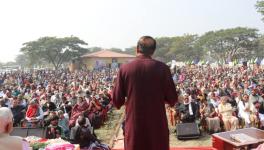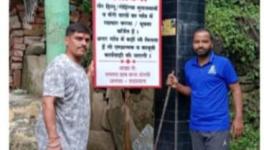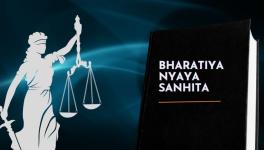Who Will Put the Genie of Communalism Back in the Bottle, and How?

Nothing puts to test the strength of India’s secular, social fabric as a hate crime does. A group of misguided and brainwashed youngsters owing allegiance to some fanatic fringe elements of right-wing groups orchestrate the attacks on religious minorities. The attacks on the minorities are owing to instances of hearsay, which churn on various social media groups on a daily basis particularly during elections so that rich electoral dividends can be harvested in the hustings.
The fringe elements would always look for a prey, most of them would be from the religious minorities in the wrong place at the wrong time that will fall a victim of these zombies. Hate crimes have a way of spreading and multiplying in the absence of speedy intervention by the administration with a firm hand. The onus is therefore on those in power to act swiftly against such attacks and erase the impression that those involved in the crimes would be protected from the legal consequences of their actions. Shockingly, the present dispensation has sought to rationalise these attacks. For them, “some amount of repercussions” is “natural”. The ones in power never distance themselves from such attacks.
The ones in power must send out a clear message that law and order is the top priority and that they are opposed to any kind of criminal behaviour in the name of religion. Otherwise, the government will have difficulty instilling confidence in the people, and religious minorities who will remain insecure. This could also encourage other fringe outfits that are mushrooming on a daily basis to continue to target minorities as part of a larger plan of religious polarisation and Hindu consolidation. There can be no room for triumphalism.
A hate crime is one in which crimes are committed against a person not because of what a person might have done, but because of who they are. In a communal lynching, a person is attacked for the alleged transgressions, real or imagined, past or present, of other members of that person’s community. Hate speeches are precursors to the hate crimes. In Prof. Waldron’s definition, hate speech refers to utterances that incite violence, hatred, or discrimination against people on the basis of their collective identity, be it race, ethnicity, religion, gender or sexuality. He says the limitation in these cases should be restricted to those categories of minorities who are vulnerable. Under this conception, a merely offensive statement would not qualify as hate speech. This is because hate speech, as Prof. Waldron argues, attacks two key tenets of a democratic republic: the guarantee of equal dignity to all, and the public good of inclusiveness. It is also appealing as in the Indian scenario it animates the values of liberty, equality and fraternity that the Constitution’s framers viewed as foundational. The section 153A and section 295A of the Indian Penal Code (IPC), which criminalise, respectively, speech that seeks to promote enmity between different groups and speech/acts that outrage/s religious feelings, are no more than a poor imitation of what hate speech laws ought to be and are vaguely worded.
India being a pluralistic society being home to people with diverse cultures, traditions, castes, religions, castes, and customs. Our founding fathers believed and ensured that secularism remains the only viable rational option as we are a multi-faith, multilingual country. Abandonment of secularism can only lead to more conflict and suffering for its people. We believed in the motto unity in diversity. Despite its mix of different religious groups and traditions, we have generally enjoyed a healthy, tolerant society. We celebrated fairs and festivals without the interference of the fringe groups. The actions of certain organisations and individuals in different parts of the country are aimed at minorities and women which are of serious concern to the already polarised society. The exhortations made, inflame passions, create an environment of insecurity and distrust. Free speech, though quintessence of democracy and enshrined in the Constitution, cannot be allowed to be misused to advocate, incite, promote or justify hatred and violence against a person or community. Incidents of violence have often preceded and followed political hate speech. These incidents of vigilantism and mob lynching were a reminder of the deep social cleavages in our society. They also soon exposed the limitations in the criminal justice system. Political analysts, commentators, members of the civic society noted the failure of the law enforcement agencies to rein in the perpetrators. We may fail to see how everyday poverty and segregation enable violence. This reminds us that overt violence breaks out from intractable and often invisible marginalisation.
Religion-motivated hate crimes, on the other hand, are instances of targeted mob violence directed against an individual or family. The direct loss of life and property is far smaller than in the case of riots. But the psychological impact on the whole community of the victim(s) is probably equally damaging. The electoral outcome in 2014 marks a turning point, a qualitative shift, in the political history of Hindu nationalism. Owing to the alliances & not having majority on their own, they could not pursue their core agenda. It is only in 2014 that the present dispensation for the first time won a majority of seats in the Lok Sabha, dispensing with the need to rely on allies to run the union government. The scale of these hate crimes remains obscured and bitterly contested because of the official policy of the National Crime Records Bureau to not keep a separate record of hate crimes or mob lynching.
The recent speeches made in Haridwar include calls for the genocide of Muslims in India can be seen as part of an ongoing pattern of targeting minorities. It is ironical that such a call has been made from one of the holiest places of the Hindus by these lumpen elements calling themselves as the saviours of Hinduism. It is also observed that these lumpen elements hate Gandhiji and his idea of non-violent India. The viral hate videos gather thousands of views and in this fast world, very few try to verify the authenticity of these videos. Another strange reason is the top leaders of the ruling dispensation have enough time to vilify Jawaharlal Nehru, Muslims, and now Christians, but maintain a stony silence whenever these unfortunate events happen time and again. Hatred for the religious minorities, particularly Muslims and Christians, appears to be their pastime which has attained gigantic proportions now. It is purely political posturing for harvesting the votes during elections by spreading hate between them. Many eminent citizens from all walks of life have also attempted to write open letters to the authorities. Some journalists too have approached the apex court in an effort to put an end to this social menace.
The advent of technology has been used by the present regime to extensive use which helped them mould public opinion and voted them to power in 2014 and 2019, and in most subsequent electoral successes. The fringe elements have also misused technology by morphing pictures of women, treating them as commodities, and causing personal attacks, extreme trolling on the various social media platforms to stifle their voices which also show a perverted mindset. Serious cause for alarm of the penetration of the hatred in the families can be seen from the fact that hate is dining table conversations in such homes. This is bound to have a long-term effect on the kids that are privy to those conversations. As the kids are tech savvy, when they grow up, they make apps like Sulli deals or Bulli bai or Tech Fog, so on and so forth. Club house discussions too are another social medium used for derogatory attacks on the ladies irrespective of their age or profession. Both the apps — Sulli deals and Bulli Bai were created by young engineering students that sought to silence Muslim women by putting a price on their dignity.
The modus operandi of the hate mongers is simple. The radicalisation starts early. They view every crime happening in the society from a narrow microscope of religion & blame them for the ills prevailing in the society. They then infiltrate into educational institutions at the school level and enforce their hidden agenda. In the formative years when the students are brainwashed by them which is carried forward when they reach colleges for their professional education, and then it manifests in myriad ways that is detrimental to a pluralistic society. The objection to the wearing of the hijabs by the Muslim girl students and the counter by the Hindu boy students to wear saffron scarves, made a sordid drama in an educational institution where education must be the topmost priority. Some of the elements suggested it is an act of indiscipline. So, the seeds of communalism are sown in the teenagers that is reinforced when these students reach their youth. It is difficult to de-radicalize them. When the students enter youth stage, the so-called moral police attack any boy or girl who may be siblings under the garb of love jihad. Funding for these fringe elements may also come from narcotic drugs business too. Anti-conversion laws are passed in some of the states wherein the double engine governments (same party at both the national and state) are in power. Some rabid radical fringe elements have also demanded death penalty for conversion. Next the churches are attacked during the Sunday mass or prayers, and Christian educational institutions of repute are painted with the same brush of forced conversion to Christianity. Even a suicide owing to personal reasons are given forced conversion and communal colour as seen in the recent events unfolding in another progressive developed State where they are not in power at present. Some of the students in their youth become drug addicts, and in their stupor, may be used by these lumpen elements to harvest them during elections. It is just to publicly humiliate the Muslims from their childhood and make them second class citizens. The irony is most of the right-wing political leaders’ children are convent educated. Thanks to the double engine government, once a progressive and peaceful state of Karnataka is on the boil. The narrative for the Karnataka assembly elections due in May 2023 has been set. The Hindutva groups seem to wield a free hand with the law enforcement agencies offering little protection to the victims and going easy on the alleged culprits. It seems now that the fringe elements form the core which makes the powers to be never condemn the statements or speak about lynching incidents. The recent assembly elections results of the five states including Uttar Pradesh has proved that the voters too have endorsed this Hindutva brand (both hard and soft) of politics, and is a victory of hate over secular brand of politics. Dravidian model appears to be an apparent vaccine for the fascist virus.
Raphael Lemkin is credited with the use of the term ‘genocide’ and campaigned relentlessly for it to become an international treaty. In 1946, Cuba, India and Panama co-sponsored UN General Assembly Resolution 96(I), which affirmed genocide as a ‘crime under international law’. A convention on the prohibition of genocide was drafted, which was passed by the General Assembly in 1948 and came into effect in 1951, with more than 150 states party to the convention at present. However, since signing the Genocide Convention and ratifying it, India has not enacted any legislation to comply with it. Indian Penal Code provisions relating to rioting, unlawful assembly and ‘promoting enmity between different groups’ do not embody the basic elements of the crime of genocide, which is against a collectivity or a group, with the specific intent to cause its destruction. These also do not pertain to another key aspect of the Genocide Convention – that of prevention and creating the conditions in which such hate speech and other associated acts are not allowed to flourish, which may facilitate the commission of genocide.
Conclusions:
Print and electronic media play a crucial role in promoting understanding, tolerance, anything that is culturally sensitive. In a pluralistic society, education is another best way to promote peaceful co-existence, endurance in the nation, culture, or community. India’s secularist constitution does not have a state religion but promotes religious tolerance. Amendments to the present laws under IPC & strengthening of IT Act to take care of social media and fake news. The administration must deal with the offenders firmly without fear or favour. Ending this hatred and violence is the responsibility of all of us including the religious leaders and the government. The religious teachers need to return to their religious teachings and methods of reconciliation, otherwise our nation will crumble. The survival of secularism in India depends on how successfully we set up systems of cooperation within ourselves. The vaccine is with the voters who have to administer it in the right doses at the right time and remain vigilant during elections if we are to remain a functional vibrant democracy taking pride in our secular ethos and in unity in diversity. The social media is unregulated at present. Hence, to regulate it, as the law & order is a State subject, the States can appoint a senior police officer at least of the rank of ADGP heading a special cyber unit who can monitor and prevent the flow of fake videos, apps and rumours which spoil the peace of the society that is almost polarised on religious lines today.
*The author is a concerned Indian citizen.
Get the latest reports & analysis with people's perspective on Protests, movements & deep analytical videos, discussions of the current affairs in your Telegram app. Subscribe to NewsClick's Telegram channel & get Real-Time updates on stories, as they get published on our website.
























